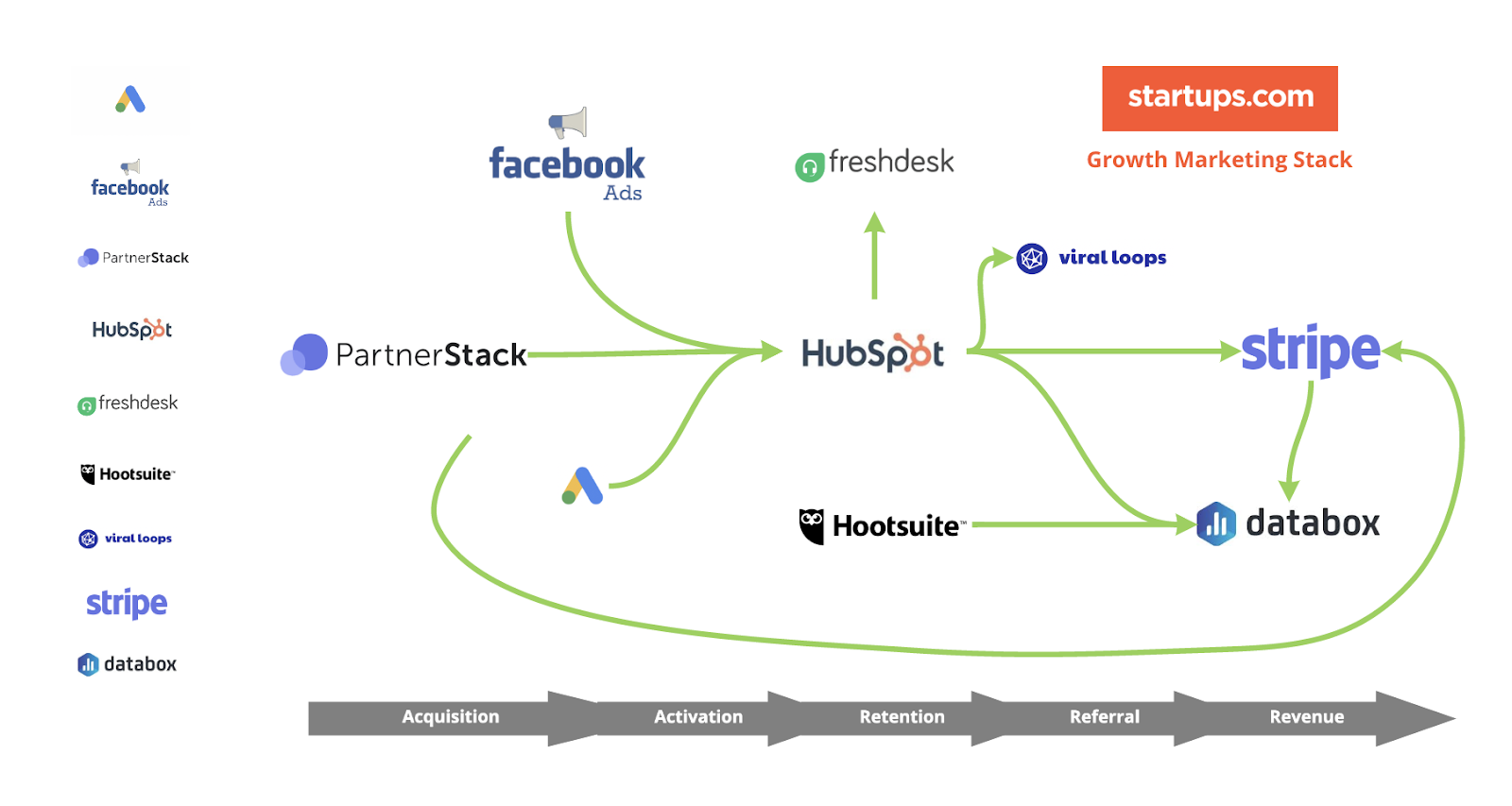Forums Search

A Growth Marketing Stack for Startups
Startups.com marketing technology stack
What is a Martech Stack?
First up, what even is Martech? This is an abbreviation of “marketing technology.” It’s the tools and software you use in your day-to-day sales and marketing.
The reference to the “stack” has been used by developers for years, in reference to the technology and codebases they use within the products they build. Martech Stack references the marketing technologies and tools you use within your marketing infrastructure set-up.
By stacking these tools together and integrating them you create a consistent, automated flow of data between your tools.
The benefits of setting up a Martech Stack
The likelihood is that you already have some form of Martech Stack in place, even without...

The Woman Behind Argentina’s Startup Revolution — Interview with Lisa Besserman, CEO and Founder of Startup Buenos Aires
I believe passion is infectious, and when you get likeminded individuals in a room together, discussing real change and impact for not only a company or organization, but also an entire city, it creates a real sense of dedication.
Buenos Aires, Argentina, is not the first place that people think of when they think of startups — but that’s going to change if Lisa Besserman has anything to say about it.
Lisa’s organization, Startup Buenos Aires (SUBA), has been working tirelessly for the past few years to harness and unite the massive amounts of creative energy and technical knowledge that are floating around South America’s most dynamic city.
In just three years, Lisa and her team have not only created a resource hub for entrepreneurs in Bue...

Espionage In The Era Of The Entrepreneur: How Safe Is Your Intellectual Property?
In a world where business moves at the speed of the IOT, and where data and passwords are more readily available online, entrepreneurs have a new obstacle to address: the protection of their intellectual property.
While corporations have the resources to hire top cyber security teams and implement software solutions that protect their collateral, criminals are increasingly taking an interest in small and medium sized businesses. The new targets have equally marketable data, designs and digital information that have value for criminals, and for foreign governments.
The question to ask: Is your business at risk?
The technology industry and foreign policy
In 1986, China began a program that has been loosely referred to as “shadow innovation”...

Breaking down silos — no herding cats anymore
In my last blog post, I spoke about siloed content caused by silos within an enterprise. Moreover, about the guy who is on the hook to drive the business, generate leads and protect the brand. In most organizations they call him the Chief Marketing Officer or CMO. He is focused on the connected, consistent customer journey.
Yeah, this feels like herding cats — an attempt to control or organize a class of entities which are uncontrollable or chaotic.
Because in a larger organizations, everyone creates content. Sometimes people do not even know that this content ends up being customer facing. Some folks in Support writing some messages in support systems — but is it necessarily on brand and on target?
Let’s break down the customer journey — ...

Living The Dream
If you are one of those people who consumes every bit of Silicon Valley management science you can find, you will be familiar with Ben Horowitz, co-founder of the venture capital firm Andreessen Horowitz. If you aren’t — for some reason — his writing will be a breath of fresh air, compared to the rest.
Horowitz was a little known figure for most of his time in the Valley, until his blog, swagger, swearing, and love of hip hop made him one of the most entertaining smack talkers and truth talkers in our industry.
Here’s how he got his start:
Sarah Lacy: How did you first get involved in Silicon Valley?
Ben Horowitz: I was actually a student at Columbia in New York. I got a summer internship at Silicon Graphics, and I had no idea what Silico...

Ready for Anything: Kapture and the Importance of Evolving with the Market — Interview with Mike Sarow, CEO and Co-Founder of Kapture
“Sometimes your spidey sense is like, ‘I don’t know if either one of these are right,’ but you have to go somewhere. Spinning your wheels, being in neutral? That’s bad.”
When you hear Founders out in the media talking about their product, most of what you hear them talk about is all the things that went right: the hypotheses that were confirmed, the “ahah” moments where all the pieces fell into place.
Founders Don’t Discuss The things they didn’t know
What you don’t hear most Founders talking about: all the things they didn’t know – the times a big bet didn’t pay off, the times when what you thought was true turned out not to be the case, the times when the market turned on a dime and suddenly everything you’d been working to build was no l...

Forget Coffee Shops. Spacious is the Future of Coworking — Interview with Founder Preston Pesek
A weird thing started happening about five to ten years ago. In cities across the country, coffee shops rapidly made the transition from lively spaces full of chatter, dates, friends, and books to libraries inhabited by intense humans staring into screens, each in their own earphone-isolated world.
I was one of those people; one of the first to start working remotely when I wasn’t able to get a “real job” during the Great Recession.
Back then, even as the coffee shops filled to a breaking point and people waged passive aggressive evil eye wars over the too-few plug points, we were still in the minority.
Today, however, we’ve added coworking spaces in every major city and more than a few minor ones, but coffee shops are still packed to break...

Company Activities That Will Strengthen Any Culture
These days, culture is paramount for having a strong team to execute your business’ vision. Ideas are worthless on their own; without a strong team, you won’t succeed. When building a business, you want employees who deeply about the company. A big piece of that is recognizing that, at the end of the day, they’re just people with normal daily stresses and worries.
My company TheSquareFoot is an unconventional business—we’re taking commercial real estate into the digital age—so we’re used to alternative practices. But like our business model, our unconventional ways have a purpose and rely on three major points: team building, nourishment and fun. Throughout our growth, I’ve recognized a few unconventional ways (that anyone could try) to pos...

Designing For Diversity: A Top Designer’s 6-Step Process
Tech has a very obvious diversity problem — and it’s coming out in insidious ways. For example, in April, Snapchat released a Bob Marley filter that essentially put users in blackface.
In August, they came out with a yellow face filter, which transformed users’ faces into a stereotypically “Asian” face. These racist releases from a company that boasts 8 billion video views per day had people around the world wondering how, exactly, these filters slipped through the filter.
The answer is simple: They’re not designing for a diverse audience.
It’s one thing to say ‘We’re trying to make tech more inclusive’ but what we’re really trying to do is create places where people feel they belong.
Benjamin Evans is a UX/UI designer who has worked with a...

The 13 Top Reasons Why Startups Fail
Fail fast. Fail forward. Those are just two of the mantras you’ll see hanging in startup offices and incubators across the globe. In the startup world, a failure is considered a learning opportunity, at the least; a feather in the cap of the Founder, at best. We fetishize failure. We normalize it.
But as much as we talk a good game about failure, the reality is that failing sucks. Just as no one goes into their wedding day planning for divorce, no one starts a company thinking, “Yeah, this one will just be my starter. I’ll get it right next time.” No wants to fail, and yet the majority of startups do fail.
According to an examination of startup businesses (by which they mean new companies in general) in the United States conducted by Stati...